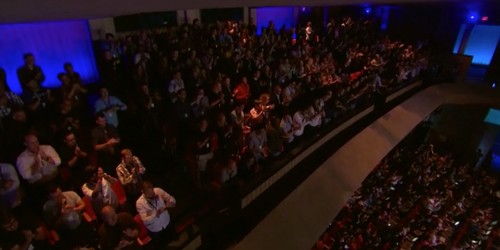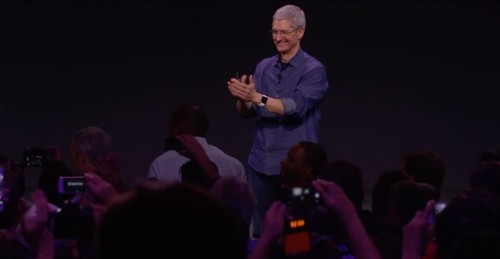
What are all those people celebrating with their standing ovation? Even the guy on stage is applauding. Sure the new product is exciting, but applause? Unlike a play or a musical performance (even a U2 performance), nothing is actually happening on stage when a product is announced. All that work that goes into making a product was done months ago, and the audience isn’t even being asked (at the moment) to thank the people that made the product. Instead of rapt silence or an excited buzz, lots of people are moved to show their unbridled enthusiasm in a very specific way. It is the same kind of collective reaction that comes after a political speech and I don’t think that’s a coincidence. When we applaud the Apple Watch we’re applauding an imagined future.
As I’ve argued before, Apple events don’t just show us what’s for sale, instead they are “a demonstration that the product on display is part of a life always aspired to but never totally lived.” This is why I don’t think we should dismiss Apple events as mere salesmanship. This particular brand of bombastic salesmanship works for reasons that are important for understanding why a wearable computer is treated like the president during a State of the Union address.
First, it’s worth paying close attention to what is actually said by the presenters. Along with very loaded words like “relevant”, “individuality”, and “intimate” there are a few phrases that get repeated several times:
- “The most personal device we’ve ever created.”
- “Apple builds great products that enrich people’s lives.”“
- “Apple Watch helps you live a better day.”
Then there are sentences that describe relatively mundane features in monumental ways:
- “It will fly you to the moon.”
- “You can advance time.”
- “This is the actual position of the planets for this time.”
Finally, there are the kinds of declarative sentences that seem to reinforce the inevitability of the kind of sociotechnical world that past Apple products have brought about:
- “Precious photos number in the hundreds instead of a couple.”
- “You can’t determine a boundary between the physical device and the software. “
The Apple Watch takes on so much more than itself. It has to bend the world through itself and back out to the audience. You have to see and understand what the world will be like with the Apple Watch in it; mediating conversations, bodies, and environments. And while the technology inside the device is certainly impressive, it really isn’t doing anything spectacular. It isn’t ending world hunger, curing cancer, or reversing climate change. It’s just playing music and receiving notifications like four other devices you already own except now it is on your wrist and looks pretty. So why the applause? What kind of future is this really heralding?
The Italian critic and media activist Franco “Bifo” Berardi describes the 20th century as “the century that trusted the future.” It was a time where it was apparent to reasonable people that the entire population would be fed and housed within a lifetime. And while the more developed nations have certainly been guilty of conflating technological development for social progress it was actually the nations still struggling to build a manufacturing base by the early 20th century, like Italy and Russia, that produced the most radical (and fascist) futurist movements. Futurists saw technology not only as a solution to existing social problems, but as having its own aesthetic and moral values that superseded anything that had ever been seen or done. Italian futurists latched onto the racing car as their totem: it represented the promise of speed as a world-conquering ability, and yet the car itself was good for nothing but going fast. Speeding things up wasn’t in service of anything, it was its own self-evident good. Futurists didn’t actually love race cars so much as they loved the idea of imbuing the world around them with the qualities of speed and acceleration.
If 20th century Futurists loved the race car, Bifo argues, then 21st century technocrats are in love with technologies that augment the body with information: “The bio-info machine is no longer separable from the body or mind, because it’s no longer an external tool, but an internal transformer of body and mind, a linguistic and cognitive enhancer.” Sound familiar?
Put side-by-side like this, Apple events don’t look much different than NASCAR races. Apple Events, like NASCAR races, require a lot of skill, and finite resources to pull off. It is communitarian conspicuous consumption. It isn’t just a celebration of the resources and skill on display. It is also the form in which they are presented that, I surmise, gets people really excited. Unlike NASCAR however, the Apple Event also announces a near future, a benchmark that reassures us that we are moving ever closer to a realized science fiction.
Any major product announcement isn’t much different than a State of the Union address. In fact, considering how quickly new products are adopted and how slow much needed legislation is passed, one could even argue that product announcements (whether or not you actually buy the product) are more likely to impact your day-to-day life than the declarations of a sitting president. When audiences applaud a device, they’re applauding the sort of life it outlines: one where we start to get more exercise, have intimate conversations with loved ones, and express ourselves with the preciseness necessary to stand out among 7 billion fellow humans.
Just like the Italians and Russians of the 20th century we might feel “behind” when compared to the educated social democracies of the Nordic countries or the manufacturing capabilities of China, but we can celebrate ourselves by reacting positively to a particular configuration of qualities that we see reflected in the watch face. If we didn’t value our health and each other, why would we make such a fine product that helps us appreciate both of these things? Of course part of the salesmanship is making you feel as though you are not completely actualizing these qualities and it is the product that will help you “live a better day.”
The phrases I listed above reinforce the idea that the Apple Watch is meant to make us feel like we are collectively embodying and achieving great societal feats. We may not be able to literally fly to the moon, stop time, and transcend the distinction between bits and atoms, but we value that kind of power. More important than the Apple Watch itself is the story it elicits about the society it serves. When Jony Ive or Tim Cook say they have “seamlessly blended performance and beauty to deliver a device that frees you to live a better life” they aren’t speaking in over-wrought generalities so much as they are describing the qualities (performance, beauty, and freedom) that neoliberal actors want to see in themselves. All the more insulting then, that such a flattering portrait was shattered by U2’s “dystopian junk mail.”


Comments 4
14th September: A Lull | Too Much Time — September 14, 2014
[…] sceptical and sneery at their products from within the beast. This, anyway, is an academicy/tossy look at the ideology of Apple’s […]
Thriving In Transitions - Episode #29 - Rocket to 30: A podcast by Eston College — October 10, 2014
[…] Josh brings up the recent product launch from Apple regarding the iWatch, and we discuss how Apple tries to make us desire their products. Josh mentioned an article about the launch which you can read here. […]